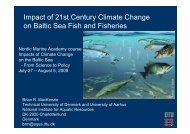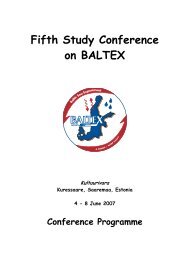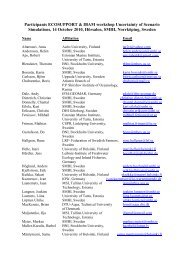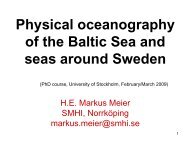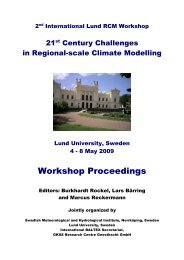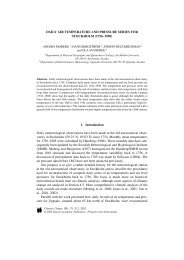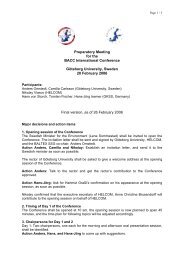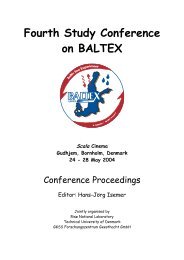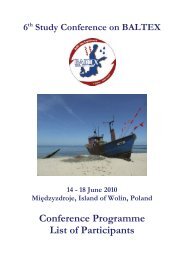BALTEX Phase II 2003 â 2012. Science Framework and ...
BALTEX Phase II 2003 â 2012. Science Framework and ...
BALTEX Phase II 2003 â 2012. Science Framework and ...
You also want an ePaper? Increase the reach of your titles
YUMPU automatically turns print PDFs into web optimized ePapers that Google loves.
78<br />
<strong>BALTEX</strong> <strong>Phase</strong> <strong>II</strong> <strong>Science</strong> <strong>Framework</strong> <strong>and</strong> Implementation Strategy<br />
1) Developing coupled models of changes in climate, l<strong>and</strong> cover <strong>and</strong> hydrological processes. The<br />
aim of this research, which should also include the development of scenarios, is to better<br />
underst<strong>and</strong> the impacts of changes on regional climate, runoff, <strong>and</strong> water quality, <strong>and</strong> to<br />
determine the best management responses for conserving water.<br />
2) Creating inventories of surface water storage <strong>and</strong> its changes. Such inventories, based on new<br />
satellite sensors <strong>and</strong> data processing methodologies as utilized by <strong>BALTEX</strong>, can be employed<br />
in the decision support systems planned by GWSP.<br />
3) Developing datasets of climate variability. Datasets of historical climatic variability derived<br />
from satellite data, as well as datasets of possible future climate variability based on scenariodriven<br />
model outputs, are important to investigations of water-management strategies.<br />
Because the development of these kinds of datasets is very time consuming <strong>and</strong> expensive,<br />
data <strong>and</strong> experience should be shared between <strong>BALTEX</strong> <strong>and</strong> GWSP.<br />
4) Identifying impacts of water management. The aim is to answer the question whether long<br />
term trends in runoff can be explained by changes in human manipulation of rivers or by<br />
variability/changes in climate. For this research long term datasets of climate <strong>and</strong> hydrologic<br />
variables obtained through <strong>BALTEX</strong> could be analysed in cooperation with GWSP.<br />
5) Utilizing regional climate models. GWSP analyses the water system on the global scale. Since<br />
water management decisions are taken at local or regional scale, <strong>BALTEX</strong> regional climate<br />
model results could be incorporated into GWSP global analyses.<br />
6) Assessing climate change impacts on water availability. The knowledge derived from<br />
<strong>BALTEX</strong> analysis of climate change will contribute to activities on climate change <strong>and</strong> water<br />
resources in GWSP. On the other h<strong>and</strong>, GWSP could contribute to <strong>BALTEX</strong> research by<br />
providing large scale scenarios for l<strong>and</strong> <strong>and</strong> water use <strong>and</strong> by cooperating in reconstructions of<br />
historical climate.<br />
7) Investigating the effects of urbanisation on water resources. Urbanisation has impacts on<br />
water systems, local water availability, <strong>and</strong> regional climate. Both <strong>BALTEX</strong> <strong>and</strong> GWSP are<br />
interested in a better underst<strong>and</strong>ing of various aspects of the water cycle <strong>and</strong> therefore could<br />
cooperate in the assessment of the important urbanization impacts on water resources.<br />
In addition to the above topics, <strong>BALTEX</strong> <strong>and</strong> GWSP could cooperate in developing tools, such as<br />
databases or decision-support systems. Cooperation concerning stakeholder involvement <strong>and</strong><br />
education <strong>and</strong> outreach activities at the international level could also be very fruitful.<br />
10.8. PUB <strong>and</strong> IAHS<br />
The research programme Predictions in Ungauged Basins (PUB) has been launched by the<br />
International Association of Hydrological <strong>Science</strong>s (IAHS) as a decadal initiative aiming at reduced<br />
uncertainty in hydrological predictions. Predictions in hydrology address water quantity <strong>and</strong> quality,<br />
surface <strong>and</strong> groundwater, snow <strong>and</strong> ice, erosion <strong>and</strong> sedimentation etc. PUB is scientifically driven but<br />
at the same time a policy relevant science expected to make a significant contribution to sustainable<br />
management of water resources throughout the world. Although PUB has its own scientific agenda, it<br />
cooperates closely with other programmes as for example UNESCO’s international hydrological<br />
programme HELP (Hydrology for the Environment, Life <strong>and</strong> Policy). PUB has an open structure<br />
building on the efforts of self-organised working groups <strong>and</strong> is coordinated by a scientific steering<br />
group.<br />
The PUB science programme focuses on the estimation of predictive uncertainty, which in many<br />
basins can be considerable for a number of reasons, including the lack of measured key-variables like<br />
stream flow. Generally, a prediction system includes (a) a hydrological model that describes the<br />
processes of interest; (b) a set of model <strong>and</strong> l<strong>and</strong>scape parameters; <strong>and</strong> (c) a model forcing, e.g. a set of<br />
meteorological input values that drive the model. The predictive uncertainty is caused by (1) errors in<br />
the model forcing; (2) an imperfect model structure; (3) the use of non-optimal model parameters; <strong>and</strong><br />
(4) errors in measurements used for model calibration. It originates from an insufficient observational<br />
basis <strong>and</strong> modelling limitations caused by the inherent multi-scale heterogeneity of the hydrological<br />
system both in space <strong>and</strong> time. PUB puts focus on improved underst<strong>and</strong>ing of the hydrological system



